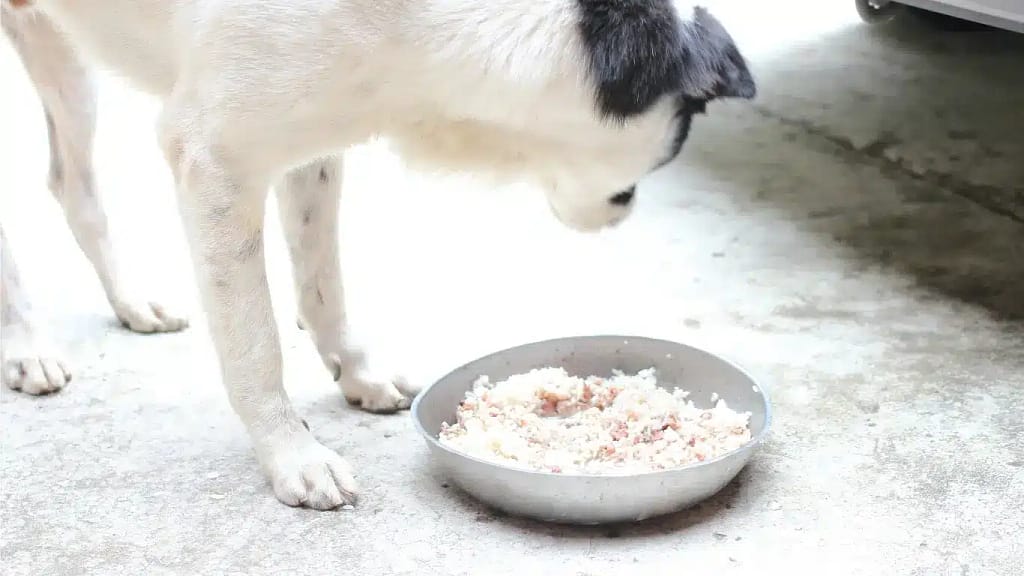Why Does My Dog Not Eat His Food But Will Eat Treats? Your pet may be unhappy regarding food, confusing and upsetting you. Learn the perplexing behavior that causes your dog to consume treats while greedily ignoring food. We know of your genuine worries and frustration with attempting to offer a balanced diet.
Find the reason for these puzzling issues as we explore potential contributors like taste preferences, medical conditions, and behavioral aspects. Let’s set out on a mission to ensure your dog has a nutritious meal, recover the fun of mealtime, and reserve those treat temptations for special occasions. The goal of this article is to explain the reasons behind this behavior and provide tips for encouraging your dog to eat more.

Table of Contents
Toggle1. Is it common for dogs to not eat their food but to eat treats?
It is common for dogs to prefer treats or table scraps over their regular food. This behavior is often a sign that something is amiss. Dogs experiencing partial anorexia may eat only a small amount of their regular food or prefer specific types of food, such as meat or human food. While some dogs may go without eating for days, others may only refuse their regular food while involved in treats.
2. why does my dog not eat his food but will eat treats? Medical And Psychological Reasons Behind Dog Anorexia
Your dog may refuse to eat his food for several medical and psychological reasons. Considering these factors to determine your pet’s best course of action is important.
- Medical Conditions
Various medical conditions can contribute to a dog’s lack of appetite. Illnesses such as gastrointestinal issues, dental problems, or infections can cause discomfort or pain when eating, leading to food refusal. Additionally, underlying health conditions, including organ dysfunction or hormonal imbalances, may affect a dog’s appetite. If your dog consistently refuses his food for more than a day or two, it is crucial to consult with a veterinarian to rule out any medical issues.
- Psychological Factors
As with humans, dogs can experience psychological distress that affects their appetite. Stress, anxiety, and depression can cause dogs to lose their appetite. Various factors, such as household changes, separation anxiety, or fear-inducing events, can contribute to psychological distress. Identifying and addressing potential stressors in your dog’s environment is important to help alleviate their food aversion.
3. Tips For Encouraging Your Dog To Eat His Food
If your dog is refusing his food but readily eating treats, there are several strategies you can try to help him regain interest in his meals. It’s important to note that these tips may only work for some dogs, as individual preferences and underlying issues can vary.
- Rule Out Medical Issues
Before implementing any changes, ensuring no underlying medical conditions are causing your dog’s food refusal is crucial. Schedule a visit with your veterinarian to thoroughly examine and address potential health concerns.
- Evaluate the Food
Take a closer look at the food you are offering your dog. Consider factors such as the food’s taste, texture, and quality. Dogs, like humans, have preferences when it comes to food. If your dog consistently refuses a particular brand or flavor, try switching to a different one that aligns with his taste preferences. Additionally, adding enticing toppings, such as bone broth or shredded meat, can enhance the aroma and appeal of the food.
- Establish a Feeding Routine
Maintaining a consistent feeding routine can help stimulate your dog’s appetite. Set specific meal times and avoid leaving food out for extended periods. Your dog will learn to anticipate and look forward to his meals by establishing a routine.
- Create a Calm Feeding Environment
Dogs can be sensitive to their surroundings while eating. Create a quiet and calm environment during mealtime to minimize distractions and reduce stress. Find a designated feeding area away from high-traffic areas or noisy household activities.
- Use Food Puzzle Toys
Food puzzle toys can engage your dog’s instincts and stimulate his appetite. These toys require your dog to work for his food by solving puzzles or manipulating the toy to access the treats or kibble inside. This mental and physical stimulation can make mealtime more enjoyable for your dog.
- Gradually Introduce New Foods
If your dog refuses his regular kibble, consider gradually introducing new foods. Start by mixing a small amount of the new food with his regular food, gradually increasing the proportion over time. This gradual transition can help your dog adjust to the new food and may pique his interest.
- Avoid Feeding Table Scraps
While offering your dog table scraps when he refuses his food may be tempting, it is essential to avoid this habit. Feeding humans food can reinforce picky eating behavior and lead to nutritional imbalances. Sticking to a balanced and nutritious diet specifically formulated for dogs is best.
- Ensure Proper Feeding Portions
Overfeeding can contribute to a lack of interest in regular meals. Ensure you feed your dog appropriate portions based on age, weight, and activity level. Consult your veterinarian to determine the right food for your dog’s needs.
- Seek Professional Guidance
If your dog’s refusal to eat persists or worsens despite your efforts, consulting with a professional dog trainer or a veterinary behaviorist may be helpful. They can provide specialized guidance and develop a tailored plan to address your dog’s feeding issues.
- Be Patient and Persistent
Changing your dog’s eating habits takes time and patience. It’s essential to remain consistent in your approach and provide positive reinforcement when your dog shows interest in his food. You can help your dog develop healthier eating habits with time and persistence.
4. When Should You Worry About Your Dog Not Eating?
While occasional picky eating may not be cause for concern, persistent refusal to eat can indicate an underlying issue. If your dog consistently refuses food for more than 24–48 hours, it is crucial to seek veterinary attention. Various medical conditions can cause loss of appetite, and early intervention is essential for precise diagnosis and treatment.
Conclusion
Understanding why your dog refuses to eat food while readily consuming treats is crucial for promoting his overall health and well-being. By ruling out medical issues, evaluating the food, establishing a routine, creating a calm feeding environment, and using various strategies to stimulate his appetite, you can help encourage your dog to eat his food. Remember, each dog is unique, so finding the best approach for your furry friend may take trial and error. With patience, persistence, and veterinary guidance if needed,
Frequently Asked Questions (FAQs)
Why Is My Dog Eating Treats But Not Her Food?
Your dog may prefer treats over her regular meal for many reasons. Treats are usually more appealing to dogs than their regular diet because of their flavor, texture, and smell. Additionally, certain medical conditions, dental issues, or a lack of appetite brought on by stress or scheduling problems could be factors in this behavior. To properly handle this issue, it's critical to assess the general health of your dog, speak with a veterinarian, and consider factors like food quality, feeding frequency, and environmental changes.
What Should You Do If Your Dog Only Eats Treats?
Taking proactive steps to meet your dog's nutritional needs is important if she chooses treats over normal meals. Start by assessing the nutritional content and quality of her existing diet. Consider switching to a premium dog food source that fits her unique dietary needs. Use positive reinforcement and compliments to get her to eat her meals as you gradually transfer her from items to her normal food. Her hunger for proper nutrition can be restored by creating a regular feeding schedule, offering a quiet dining atmosphere, and reducing the number of treats she consumes.
Do You Know Why My Dog Doesn't Eat His food But Eats Human Food?
It can be alarming when your dog rejects his food while showing interest in human food. Dogs can be attracted to the flavor, variety, and smell of human food, which may be more alluring than what they typically eat. But it's important to remember that dogs have different dietary needs than people. The best way to ensure a balanced and full dog food diet is to feed them that. Substituting human food can result in nutritional shortages and potential health problems.

